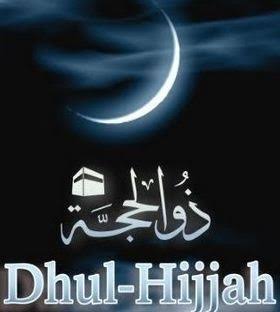Praise be to Allah Who has created Time and has made some times better than others, some months and days and nights better than others, when rewards are multiplied many times, as a mercy towards His slaves. This encourages them to do more righteous deeds and makes them more eager to worship Him, so that the Muslim renews his efforts to gain a greater share of reward, prepare himself for death and supply himself in readiness for the Day of Judgement.
This season of worship brings many benefits, such as the opportunity to correct one’s faults and make up for any shortcomings or anything that one might have missed. Every one of these special occasions involves some kind of worship through which the slaves may draw closer to Allah, and some kind of blessing though which Allah bestows His favour and mercy upon whomsoever He will. The happy person is the one who makes the most of these special months, days and hours and draws nearer to his Lord during these times through acts of worship; he will most likely be touched by the blessing of Allah and will feel the joy of knowing that he is safe from the flames of Hell. (Ibn Rajab, al-Lataa’if, p.8)
The Muslim must understand the value of his life, increase his worship of Allah and persist in doing good deeds until the moment of death. Allah says (interpretation of the meaning):
“And worship your Lord until there comes unto you the certainty.”
(al-Hijr 15:99)
The mufassireen (commentators) said: “‘The certainty’ means death.”
Among the special seasons of worship are the first ten days of Dhu’l-Hijjah, which Allah has preferred over all the other days of the year. Ibn ‘Abbaas (RadhiAllahu Anhuma) reported that the Prophet (SallAllahu Alayhi Wa Sallam) said:
“There are no days in which righteous deeds are more beloved to Allah than these ten days.”
The people asked, “Not even jihad for the sake of Allah?”
He said, “Not even jihad for the sake of Allah, except in the case of a man who went out to fight giving himself and his wealth up for the cause, and came back with nothing.”
[Reported by al-Bukhari, 2/457].
Ibn ‘Abbas (RadhiAllahu Anhuma) also reported that the Prophet (SallAllahu Alayhi Wa Sallam) said:
“There is no deed more precious in the sight of Allah, nor greater in reward, than a good deed done during the ten days of Sacrifice.”
He was asked, “Not even jihad for the sake of Allah?”
He said, “Not even jihad for the sake of Allah, except in the case of a man who went out to fight giving himself and his wealth up for the cause, and came back with nothing.”
[Reported by al-Daarimi, 1/357; its isnaad is hasan as stated in al-Irwaa’, 3/398].
These texts and others indicate that these ten days are better than all the other days of the year, with no exceptions, not even the last ten days of Ramadaan. But the last ten nights of Ramadaan are better, because they include Laylat al-Qadr (“the Night of Power”), which is better than a thousand months. Thus the various reports may be reconciled. (See Tafseer Ibn Katheer, 5/412).
You should know, my brothers & sisters in Islam, that the virtue of these ten days is based on many things:
Allah swears an oath by them, and swearing an oath by something is indicative of its importance and great benefit. Allah says (interpretation of the meaning):
“By the dawn; by the ten nights”
(al-Fajr 89:1-2).
Ibn ‘Abbas, Ibn al-Zubayr, Mujaahid and others of the earlier and later generations said that this refers to the first ten days of Dhu’l-Hijjah. Ibn Katheer said: “This is the correct opinion.” (Tafseer Ibn Katheer, 8/413)
The Prophet (SallAllahu Alayhi Wa Sallam) testified that these are the best days of this world, as we have already quoted above from saheeh ahaadeeth.
The Prophet (SallAllahu Alayhi Wa Sallam) encouraged people to do righteous deeds because of the virtue of this season for people throughout the world, and also because of the virtue of the place – for the Hujjaaj (pilgrims) to the Sacred House of Allah.
The Prophet (SallAllahu Alayhi Wa Sallam) commanded us to recite a lot of Tasbeeh (“Subhan-Allaah”), Tahmeed (“Al-hamdu Lillaah”) and Takbeer (“Allaahu akbar”) during this time. ‘Abdullaah ibn ‘Umar (RadhiAllahu Anhuma) reported that the Prophet (SallAllahu Alayhi Wa Sallam) said:
“There are no days greater in the sight of Allaah and in which righteous deeds are more beloved to Him than these ten days, so during this time recite a great deal of Tahleel (“La ilaaha ill-Allaah”), Takbeer and Tahmeed.”
[Reported by Ahmad, 7/224; Ahmad Shaakir stated that it is saheh].
These ten days include Yawm ‘Arafaah (the Day of ‘Arafaah), on which Allah perfected His Religion. Fasting on this day will expiate for the sins of two years. These days also include Yawm al-Nahar (the Day of Sacrifice), the greatest day of the entire year and the greatest day of Hajj, which combines acts of worship in a way unlike any other day.
These ten days include the days of sacrifice and of Hajj.
May Allah, Subhanahu Wa Ta’ala, Grant us the Tau’feeq to perform maximum number of Virtuous and Righteous deeds during these Blessed Days and accept them and excuse our shortcomings.
Aameen, Ya Rabbul Aa’lameen.

